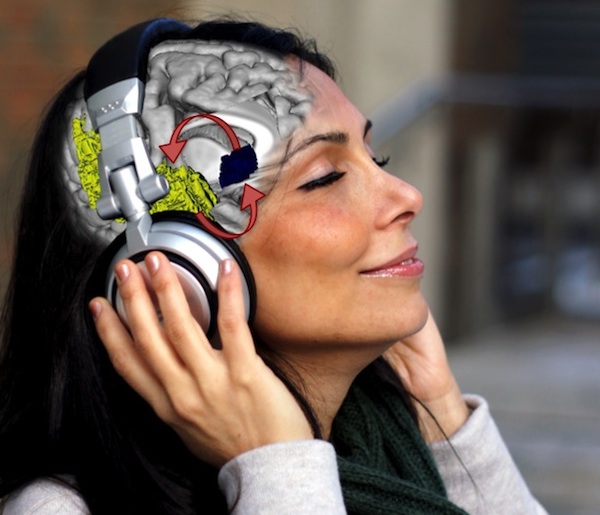September 18, 2013 – Music hath charms to soothe the savage breast… and to stimulate the human brain.
For thousands of years, we have used music in our everyday life as a means of relaxation or a source of stimulation. In the last decades, music has been used in clinical setting to promote physical and psychological health and well-being. Earlier this year, a Hill Strategies report found that pop concert attendees have a greater likelihood of reporting very good health than non-attendees. Are humans hard-wired for music? How does it affect our mood and our health? In this first of a series of three articles, we seek answers to these questions in recent – and fascinating – research by Canadian neuroscientists.
Simply put: our brain is built to enjoy and to positively react to music.
 When pleasurable music is heard, brain activity increases in the nucleus accumbens, an ancient part of the brain which is known to respond to survival stimuli like food and sex. This increased activity is accompanied by the release of the neurotransmitter dopamine, an essential signaling molecule in the brain which is involved in reward, motivation and pleasure. According to research conducted by Valorie Salimpoor and Robert Zatorre, dopamine is released not only when the music rises to a peak emotional moment, the moment when we feel a “chill” of pleasure down the spine, but also several seconds before, during what we might call the anticipation phase. This complex cerebral activity and the emotional arousal that ensues also induce several physiological reactions: a pleasurable “chill” down the spine and increases in heart rate, respiration and transpiration – much like the responses to a survival-driven stimuli.
When pleasurable music is heard, brain activity increases in the nucleus accumbens, an ancient part of the brain which is known to respond to survival stimuli like food and sex. This increased activity is accompanied by the release of the neurotransmitter dopamine, an essential signaling molecule in the brain which is involved in reward, motivation and pleasure. According to research conducted by Valorie Salimpoor and Robert Zatorre, dopamine is released not only when the music rises to a peak emotional moment, the moment when we feel a “chill” of pleasure down the spine, but also several seconds before, during what we might call the anticipation phase. This complex cerebral activity and the emotional arousal that ensues also induce several physiological reactions: a pleasurable “chill” down the spine and increases in heart rate, respiration and transpiration – much like the responses to a survival-driven stimuli.
A comprehensive literature review conducted at McGill University by Mona Lisa Chanda and Daniel Levitin, found evidence that music also affects health and well being through three other neurochemical systems:
• immunity – which involves serotonin;
• stress and arousal – which involves cortisol; and,
• social affiliation – which involves oxytocin.
Indeed, the information gathered as part of this large-scale review of the literature showed that music increased both immunoglobulin A, an antibody that plays a critical role in immunity of the mucous system, and natural killer cell counts, the cells that attack invading germs and bacteria. Listening to and playing music was also found to reduce level of cortisol, the stress hormone, in the body. There also appears to be connections between music and oxytocin, the so-called “love hormone”, which plays an important role in bonding and group affiliation.
This growing body of information on the neurology of music is providing us with many insights on the universality of music. It is also paving the way to interesting applications in other sectors: this will be the subject of upcoming articles.
Prepared by Frédéric Julien, for Orchestras Canada and CAPACOA
On the Same Topic
Music and Education: A Recipe for Success
Previous and Related News Articles
The Dialogue on The Value of Presenting Goes On
CAPACOA Responds to Temporary Foreign Workers Program Changes


